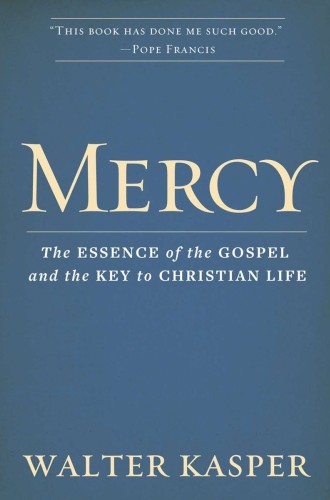Mercy, by Walter Kasper
God is merciful. This is a biblical commonplace. But how God is merciful is a theological conundrum, especially if we conceive of God in metaphysical terms as pure being. Walter Kasper notes in this stimulating book that “God’s mercy has not found its place within this framework.” To ask how one of God’s primary attributes is mercy is to ask profound questions that go to the heart of Christian theology: How does God’s mercy comport with God’s justice? How does God’s mercy affect God’s salvific will? What is the relationship of God’s mercy to the trinitarian revelation of God in the Christian dispensation? Does the fact that God is merciful mean that God suffers, and if so, what about divine impassibility?
Kasper’s original intention was to compose a set of texts about God’s mercy for some retreat conferences. His motive at that time was purely pastoral, and his reflections were largely biblical.
Excellent theologian that he is, however, he found himself meditating on God’s mercy in a far larger context because to think of God as merciful enlarges the way we think about God. Kasper’s contemplation of mercy evolved into a study that is deeply theological but still quite pastoral for at least one important reader, Pope Francis, who found it of enormous value in his own ministry.
Read our latest issue or browse back issues.
The subtitle of the book sets out its thesis economically: Mercy both illuminates the core meaning of the good news and provides the key for Christian living. The first four chapters explore the vocabulary (are mercy and compassion the same thing? how does mercy differ from empathy? from pity?), then examine the place of mercy in philosophical discourse and in the Old and New Testaments. The next four chapters spell out some systematic reflections (how does mercy relate to justice? what does this mean for the possibility of salvation for all?), discuss the relation of mercy to the great commandment to love God and neighbor, and consider how the church is measured by mercy. The final chapter offers a rich meditation on the culture of mercy, with a reflection on the theme of the Blessed Virgin as “Mother of Mercy.”
Mercy is such a well-worn word in our Christian vocabulary—how often do we cry out in the liturgy, “Lord, have mercy”?—that it is only when a sensitive theologian like Kasper brings the word to the forefront that we begin to understand its profound implications. Kasper’s work sheds a good deal of light on Pope Francis’s pastoral emphases. It helps us understand, for example, why the pope is anxious to explore the question of eucharistic participation of divorced and remarried Catholics and why he not only condemns the death penalty but cries out against perpetual incarceration. It is not accidental that a collection of the pope’s public addresses has appeared in the United States under the title The Church of Mercy.
Kasper contends that mercy is a neglected and understudied term in the Christian vocabulary. It is one of those words that is part of our common language but whose profundity we have not grasped. Furthermore, it is a word that, on first mention, seems weak and overly malleable. Tough-minded people—Nietzsche comes to mind—scorn it for its mildness as contrasted with the stern demand for justice. Too often mercy has been the privilege of the mighty, who might throw it as a bone to people who deserve stiffer consequences.
Kasper has provided a model of ressourcement theology by retrieving a primordial biblical term, detecting its deep traditional meaning, and putting it into conversation with exigent issues facing church and society. Like the good householder, Kasper has brought forth both old things and new.






